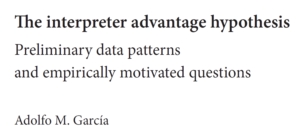The interpreter advantage hypothesis: Preliminary data patterns and empirically motivated questions
Translation and Interpreting Studies
García, A. M. (2014). The interpreter advantage hypothesis: Preliminary data patterns and empirically motivated questions. Translation and Interpreting Studies 9(2), 219-238. Online: http://bit.ly/169YMJW
La «hipótesis de la ventaja del intérprete» postula que las habilidades cognitivas específicas de la tarea desarrolladas por los intérpretes profesionales (IP) se generalizan a habilidades lingüísticas y ejecutivas más eficientes en tareas no interpretativas. En este documento se revisan los estudios pertinentes para establecer patrones de datos preliminares y esbozar nuevas preguntas de investigación. Aunque no es del todo coherente, las pruebas sugieren que la pericia en la interpretación mejora aspectos del procesamiento semántico, la memoria de trabajo y la flexibilidad cognitiva. Los datos también dan lugar a nuevas preguntas relacionadas: ¿Son las mejoras lingüísticas y ejecutivas en los IPs independientes entre sí? ¿Son todas las habilidades superiores de los IPs mejoradas acumulativamente por la doble influencia del bilingüismo y la experiencia de interpretación? ¿Y cuánto tiempo después del comienzo de la formación formal aparecen estas ventajas? Las respuestas provisionales a estas preguntas también están implícitas en las pruebas consideradas.
Para acceder al artículo hacé click AQUÍ
The interpreter advantage hypothesis: Preliminary data patterns and empirically motivated questions
Translation and Interpreting Studies
García, A. M. (2014). The interpreter advantage hypothesis: Preliminary data patterns and empirically motivated questions. Translation and Interpreting Studies 9(2), 219-238. Online: http://bit.ly/169YMJW
The ‘interpreter advantage hypothesis’ posits that task-specific cognitive skills developed by professional interpreters (PIs) generalize to more efficient linguistic and executive abilities in non-interpreting tasks. This paper reviews relevant studies in order to establish preliminary data patterns and outline new research questions. Though not entirely consistent, the evidence suggests that interpreting expertise enhances aspects of semantic processing, working memory, and cognitive flexibility. The data also gives rise to new related queries: Are linguistic and executive enhancements in PIs independent of each other? Are all the superior skills of PIs cumulatively enhanced by the double influence of bilingualism and interpreting experience? And how soon after the onset of formal training do these advantages appear? Tentative answers to these questions are also implied in the evidence considered.
To access the full paper please click here


